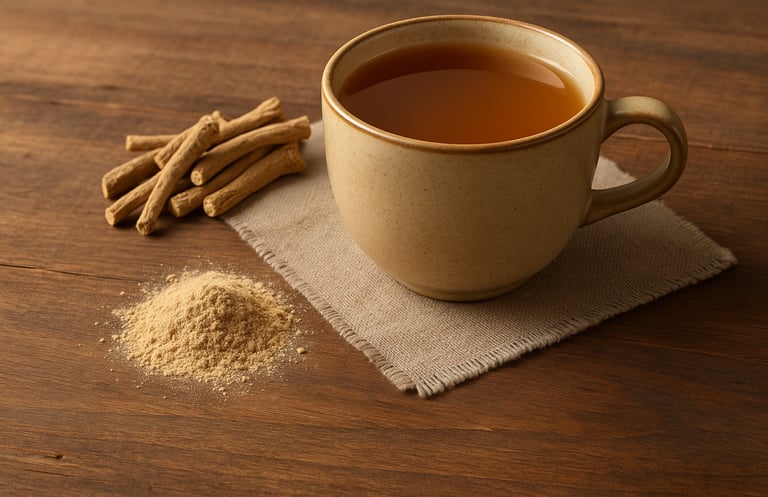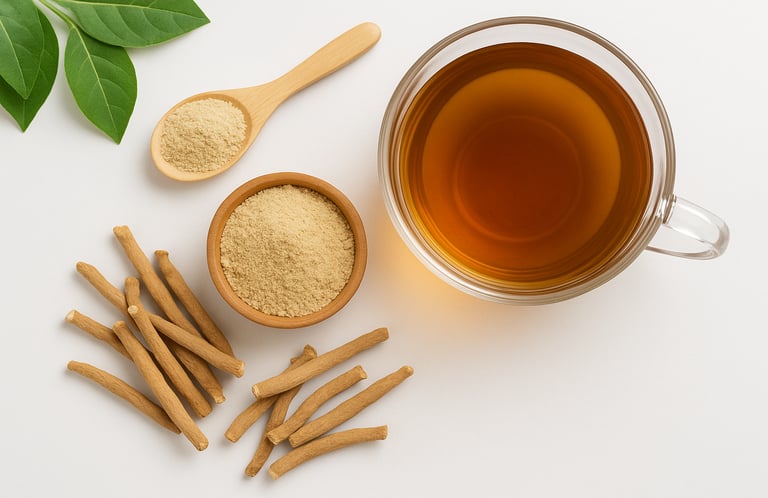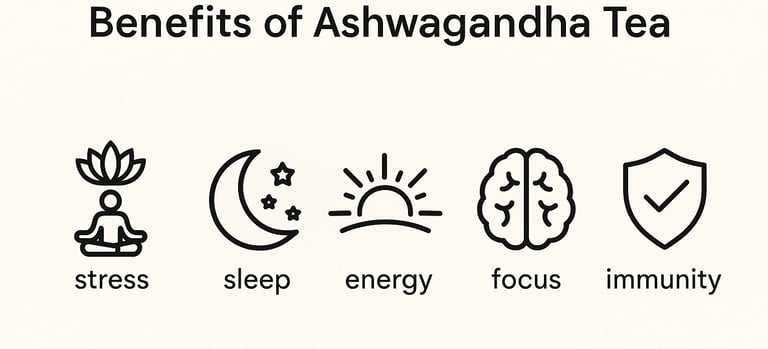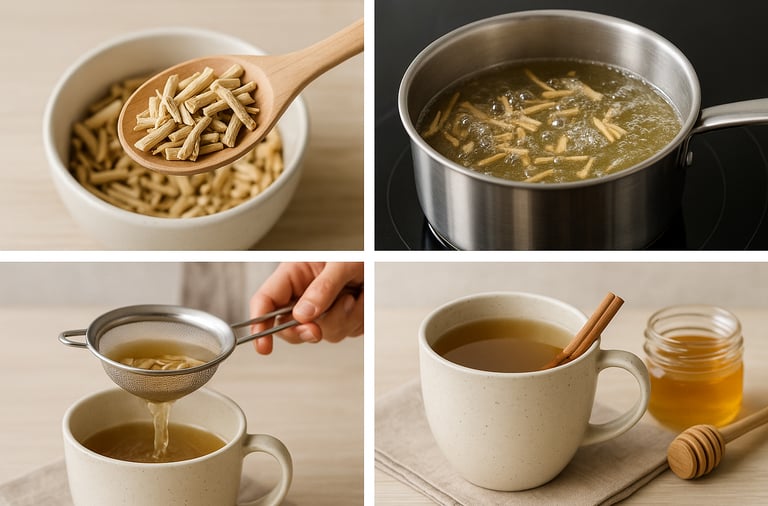Ashwagandha Tea: Benefits, Side Effects & How to Make It Safely
HEALTH & WELLNESS
The Soul Blogger
9/27/20255 min read


This website contains affiliate links. Some products are gifted by the brand to test. As an Amazon Associate, I earn from qualifying purchases. The content on this website was created with the help of AI.
Ashwagandha Tea Is Everywhere Right Now
Lately, I’ve been reaching more often for calming rituals at the end of a busy day—something that helps me unwind without screens, sugar, or another cup of coffee. That’s how I stumbled across ashwagandha tea. At first, I was skeptical. Could a simple herbal infusion really help with stress and sleep? After trying it for a few weeks and diving deep into the research, I realized why this ancient Ayurvedic remedy is suddenly trending everywhere from Pinterest to wellness blogs.
In this guide, I’ll walk you through what ashwagandha tea actually is, the scientifically backed benefits, the potential side effects you need to know, and exactly how to brew it at home. I’ll also share some trusted Amazon finds if you’d rather buy pre-made teas instead of brewing from scratch.
What Is Ashwagandha Tea?
Ashwagandha (Withania somnifera) is a medicinal root used for over 3,000 years in Ayurveda, India’s traditional system of medicine. Its Sanskrit name translates to “smell of the horse,” referring both to its strong scent and the belief that it imparts the strength and stamina of a horse.
Unlike capsules or powdered supplements, ashwagandha tea is typically made by steeping dried root (or powder) in hot water. This method releases its adaptogenic compounds, especially withanolides, which are thought to help the body adapt to stress and restore balance.
Some blends combine ashwagandha with calming herbs like tulsi (holy basil), chamomile, or lavender, creating a soothing evening drink.


Evidence-Based Benefits of Ashwagandha Tea
While much of the buzz around ashwagandha tea comes from traditional use, modern science is catching up. Here are the best-supported benefits:
1. Reduces Stress & Anxiety
Studies suggest ashwagandha can lower cortisol (the stress hormone) by up to 30% in just 60 days.
Participants in clinical trials reported significant reductions in stress, anxiety, and fatigue compared to placebo groups.
Drinking it as a tea adds a mindfulness element—the ritual of sipping something warm is soothing in itself.
2. Supports Better Sleep
Ashwagandha may improve sleep latency (how quickly you fall asleep) and sleep quality.
A 2020 study found participants who took ashwagandha daily reported significant improvements in sleep compared to placebo.
Drinking it in the evening as part of a bedtime routine can create a natural “off switch” for your mind.
3. Boosts Energy & Endurance
While it calms the nervous system, ashwagandha has also been shown to improve stamina and physical performance.
In small studies, athletes supplementing with ashwagandha displayed increased endurance and muscle strength.
As a tea, it may offer a gentle lift—without the jitters of caffeine.
4. Enhances Cognitive Function
Early studies suggest ashwagandha may support memory, attention, and focus.
Its anti-stress properties indirectly benefit brain health, since chronic stress is a major driver of cognitive decline.
5. Anti-Inflammatory & Immune Support
Ashwagandha has antioxidant effects and may help regulate immune response.
Traditionally, it’s been used to strengthen resilience against illness and fatigue.


Possible Side Effects & Precautions
While generally safe, ashwagandha tea isn’t for everyone. Be cautious if you fall into these categories:
Pregnant or breastfeeding women: Avoid unless cleared by a doctor.
Thyroid conditions: Ashwagandha may increase thyroid hormone activity.
Autoimmune disorders: Could stimulate the immune system, worsening symptoms.
Medication interactions: May interact with sedatives, SSRIs, blood pressure or thyroid medications.
Tip: Always consult your healthcare provider before starting ashwagandha, especially if you have medical conditions or take prescriptions.
How Much Ashwagandha Tea Should You Drink?
There’s no universal dosage for tea, but here are guidelines based on studies and traditional use:
Powdered root: 1–2 teaspoons (about 3–6 grams) simmered in water daily.
Extract powder: Lower doses (300–500 mg standardized extract) are typical.
Tea bags or blends: Follow package directions—usually 1–2 cups daily.
For sleep, drink it in the evening about 30–60 minutes before bed. For stress or energy balance, try a morning or mid-afternoon cup.


How to Make Ashwagandha Tea
Here’s a simple recipe you can try at home:
Ingredients
1–2 teaspoons dried ashwagandha root (or 1 teaspoon powder)
1 cup water
Optional: milk (cow, oat, or almond), honey, cinnamon, cardamom
Instructions
Bring water to a gentle boil.
Add ashwagandha root or powder.
Simmer for 10–15 minutes (longer for root pieces).
Strain into a mug.
Add honey or spices for taste.
Tip: For a creamier, chai-style tea, simmer with milk instead of water.


Best Ashwagandha Teas You Can Buy
If DIY brewing isn’t your thing, Amazon has plenty of convenient options. Look for:
Organic root pieces – Best Price Found Here
Tulsi + ashwagandha blends – Quality Taste & Strength
Pre-made tea bags – Best Value
When shopping, check labels for:
Organic certification
Withanolide content (the active compound)
Minimal fillers
FAQ
Can you drink ashwagandha tea every day?
Yes, many people do. Stick to 1–2 cups daily, unless otherwise directed by your doctor.
Is ashwagandha tea safe at night?
Yes—many people find it relaxing before bed.
Does it contain caffeine?
No, it’s naturally caffeine-free.
How long until I notice results?
Some feel calmer after the first cup; others see changes after consistent use for 2–6 weeks.
Tea Time Thoughts
For me, sipping ashwagandha tea has become more than just a wellness habit—it’s a pause button. The earthy, slightly bitter taste reminds me to slow down, while the science-backed benefits reassure me that I’m doing something good for my body.
If you’re curious about natural ways to lower stress, sleep more deeply, and restore balance, ashwagandha tea is worth trying. You can brew it yourself with a few simple ingredients, or pick up a ready-made blend from Amazon. Either way, it’s a gentle ritual that can support both mind and body—one calming sip at a time.
Hi! I’m Barbora, the voice and heart behind The Soul Blogger. I’m a creative spirit who finds joy in home projects, cozy spaces, soulful travel, and simple-yet-beautiful living. I started this blog as a personal outlet—a place to share my inspirations, explore fresh ideas, and connect with others who value both beauty and meaning in everyday life.
I live surrounded by the rhythms of family life and find peace in moments of creativity, whether I’m crafting a DIY project, styling a comforting corner of my home, or discovering a hidden café in a far-off city. Travel—especially journeys that blend culture, food, and stunning scenery—fuels my sense of wonder and storytelling.
This blog reflects my world—warm, intentional, and full of heart. Whether you’re here for a new recipe, a mindful lifestyle tip, or inspiration for your next adventure, I hope you leave feeling inspired to create a life that feels like home to you.



